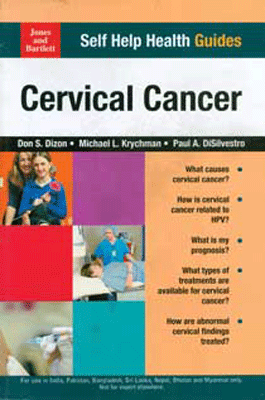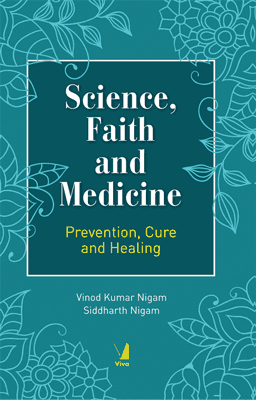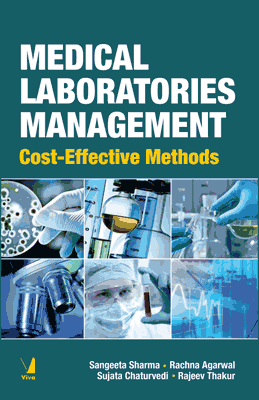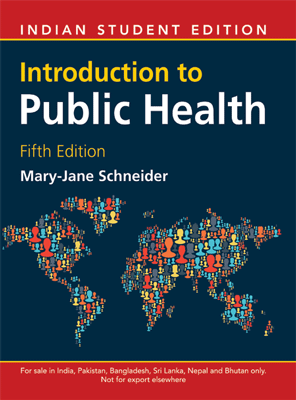Self Help Health Guides : Cervical Cancer
Self Help Health Guides : Cervical Cancer
₹148.50 ₹165.00 Save: ₹16.50 (10%)
Go to cart-
Out of Stock
ISBN: 9789380108605
Bind: Paperback
Year: 2012
Pages: 176
Size: 153 x 229 mm
Publisher: Jones & Bartlett Learning
Published in India by: Jones & Bartlett India
Exclusive Distributors: Viva Books
Sales Territory: India, Nepal, Pakistan, Bangladesh, Sri Lanka, Bhutan
Reviews:
Drs. Dizon, DiSilvestro, and Krychman have written a book that answers a multitude of questions that both women and their partners and families contend with when given the diagnosis of cervical cancer. In one place, women can now get step-by-step information not only about the physical aspects of their disease, but just as importantly, about the emotional and sexual challenges they face. The authors are to be commended on a very readable, highly informative, and essential text for the women and families they take care of"
- Lori A. Boardman, MD, ScM Associate Professor of Obstetrics and Gynecology Director of Colposcopy The Warren Alpert Medical School of Brown University Women & Infant’s — Hospital of Rhode Island
Description:
The only text to provide both the patient’s and doctor’s views, Jones and Bartlett Self Help Health Guides Cervical Cancer aims to provide a much needed primer for patients and their families, addressing the questions most relevant to a woman following a diagnosis of pre-invasive changes or invasive cervical cancer. This text gives up-to-date, authoritative, practical answers to your questions about cervical cancer, not only regarding the diagnosis and treatment of the disease, but also female survivorship. Jones and Bartlett Self Help Health Guides Cervical Cancer is an invaluable resource for anyone coping with the physical and emotional turmoil of this frightening disease.
Target Audience:
An invaluable guide for women suffering from cervical cancer, their families, friends, co-workers, etc.
Contents:
Introduction
Part 1: The Basics
Questions 1-5 give basic information about cervical cancer, with topics such as:
• Where is the cervix • What does it do?
• What is cancer?
• How do you screen for cervical cancer?
Part 2: Risk Factors and Cofactors
Questions 6-14 outline a number of factors that are associated with cervical cancer, including:
• How is sexual activity associated with a risk for cervical cancer?
• Can use of birth control pills increase my risk of cervical cancer?
• How is HIV related to cervical cancer?
Part 3: Screening and Early Cervical Changes
Questions 15-19 cover screening and detection:
• What is a Pap test?
• If a Pap test comes back abnormal, does it mean I have cancer?
• What is ASCUS • What about AGUS • Are they the same thing?
Part 4: Treatment of Abnormal Pap Tests
Questions 20-26 discuss what treatment options are available, such as:
• What is a cone biopsy
• When do you have to do this?
• Are there any risks if you have a part of your cervix removed?
• Are there alternatives to excision?
Part 5: Diagnosis and Staging: Invasive Cervical Cancer
Questions 27-33 discuss general information on the diagnosis of cervical cancer, including:
• Are there different types of invasive cervical cancer?
• How does cervical cancer spread?
• What is a sentinel node biopsy?
Part 6: Treatment of Invasive Cervical Cancer: Early-Stage Disease
Questions 34-41 examine cervical cancer as an early-stage disease and corresponding treatment options:
• What does it mean to have early invasive cervical cancer?
• How does a surgeon decide if I can keep my uterus?
• What if I don’t want surgery • What other options do I have?
Part 7: Treatment of Invasive Cervical Cancer: Locally Advanced Disease
Questions 42-46 examine cervical cancer as a locally advanced disease as well as appropriate treatment options:
• What does it mean if my cancer is locally advanced?
• Shouldn’t surgery still be done if my cancer has spread beyond my cervix?
• What is neoadjuvant chemotherapy?
Part 8: Treatment of Metastatic, Advanced, or Recurrent Cervical Cancer
Questions 47-51 examine cervical cancer as a metastatic, advanced, or recurrent disease as well as appropriate treatment options:
• What is the prognosis for women whose disease is advanced?
• How can cervical cancer come back if my cervix was removed?
• What treatments are available for women whose disease is not curable?
Part 9: Treatment at the End of Life
Questions 52-58 help to sort through information for terminal patients, including:
• How will I know when I am terminal?
• What do I tell my family?
• What does hospice mean?
Part 10: Survivorship Issues After Cervical Cancer
Questions 59-70 discuss general health issues that occur after cancer diagnosis and treatment, such as:
• What should I know about my general health maintenance?
• I no longer have periods and my menopausal hot flashes are very troublesome. What can I do?
• Should I stop smoking • What about alcohol?
Part 11: Sexuality After Cervical Cancer
Questions 71-83 address issues related to sexuality and intimacy that follow cancer diagnosis and treatment, including:
• Do many cervical cancer survivors experience sexual complaints?
• What are the psychological changes after cancer that may impact sexual functioning?
• What pharmacologic interventions can improve my sexual function?
Part 12: Fertility and Cervical Cancer
Questions 84-87 address concerns about fertility, including:
• Have there been successful pregnancies after women underwent a radical trach-electomy?
• What can be done to preserve my ability to have children in the future?
• Can I adopt children after a diagnosis of cancer?
Part 13: Prevention and Screening
Questions 88-100 are concerned with minimizing the risk of cervical cancer and cover such topics as:
• Are there guidelines on when and how often Pap tests should be done?
• What is the cervical cancer vaccine?
• Where can I get more information?
Glossary
Index
About the Authors:
Don S. Dizon, MD, is a board-certified medical oncologist specializing in the care of women’s cancers. He received his MD from the University of Rochester School of Medicine and Dentistry and trained in Internal Medicine at Yale-N ew Haven Hospital. He received his training in Medical Oncology at Memorial Sloan- Kettering Cancer Center and was a member of the Gynecologic Oncology Disease Management team and Clinical Assistant Attending in the Development Therapeutics Program. He is a past recipient of a Clinical Development Award from the American Society of Clinical Oncology to evaluate platinum resistance in ovarian cancer. In 2003, he departed Memorial Sloan-Kettering for Women & Infants’ Hospital in Providence, Rhode Island, where he now serves as the Director of Medical Oncology and Integrative Care and is Co-Director of the Center for Sexuality, Intimacy, and Fertility for the Program in Women’s Oncology. He holds a dual appointment in Obstetrics and Gynecology and Medicine in the Warren Alpert Medical School of Brown University. He is a member of the Gynecologic Oncology Group and serves on the Developmental Therapeutics Committee and Phase I Subcommittee. In 2005, he was elected a Fellow of the American College of Physicians. He continues to conduct clinical research in survivorship, decision making, and novel treatments in women’s cancers.
Michael L. Krychman, MD, is the Medical Director of The Sexual Medicine Center at Hoag Hospital in Newport Beach, California and the Executive Director of the Southern California Center for Sexual Health and Survivorship Medicine also located in Newport Beach, California. He is the former Co-Director of The Sexual Medicine and Rehabilitation Program at Memorial Sloan-Kettering Cancer Center and was an associate clinical attending faculty member at Cornell- Weil Medical School in New York City. Previously on hospital staff at Temple University Hospital and Episcopal Hospital in Philadelphia, he was the Medical Director of Labor and Delivery. Dr. Krychman holds licenses from three states including California, Pennsylvania, and New York and is a board certified obstetrician and gynecologist. He is also a clinical sexologist and has completed his Masters in Public Health and Human Sexuality.
Paul A. DiSilvestro, MD, is a board-certified gynecologic oncologist specializing in the care of women’s cancers. He received his MD from the University of Vermont College of Medicine and trained in Obstetrics and Gynecology at Women & Infants’ Hospital/Brown University School of Medicine in Providence, Rhode Island. He then completed a Gynecologic Oncology fellowship at the University of Oklahoma Health Sciences Center. Dr. DiSilvestro has served as academic faculty at the State University of New York at Stony Brook and most recently with the Program in Women’s Oncology at Women & Infants’ Hospital/Warren Alpert Medical School of Brown University in Providence, Rhode Island. He is the Principal Investigator for Gynecologic Oncology Group research at Women & Infant’s Hospital and serves on the Ovarian Cancer Committee and the Cancer Prevention and Control Committee of the Gynecologic Oncology Group. He currently serves as the Principal Investigator of a National Cancer Institute/Gynecologic Oncology Group trial for the treatment of cervical cancer. Elected as a Fellow of the American College of Obstetricians and Gynecologists and the American College of Surgeons, Dr. DiSilvestro continues to make clinical research into the treatment of gynecologic cancer the main focus of his academic career.







